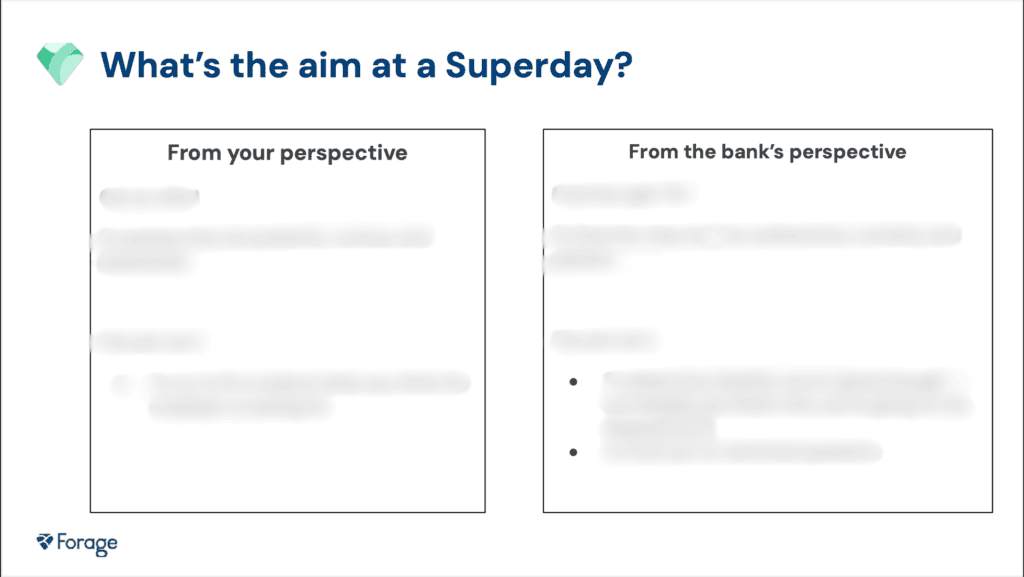If you’ve been invited to participate in a bank’s Superday, congrats! This is the final step in the process of becoming an investment banking intern or analyst. Superday involves going through multiple rounds of interviews over the course of a day (or a weekend). The process is designed to be stressful and test your ability to keep up with the work pace of investment banking. Luckily, we’ve compiled a guide to help you navigate Superday and hopefully land an offer.
What Is Superday?
Superday is a day (or two!) jam-packed with interviews and networking events — the final step in the interview process for investment banking intern and analyst roles. The primary purpose is for you to meet senior investment bankers and hiring teams in person and for the bank to determine if you’re the right fit for the team.
Every bank handles its Superday a little differently. Some take place at a hotel or conference center, while others are at the bank’s main or regional offices. Some companies may even hold portions of the day virtually.
While Superday is the final step in the interview process, it isn’t a time to relax. Considering that Goldman Sachs is reported to have a 1.5% acceptance rate into its internship programs, and JPMorgan only had around 400 openings for nearly 50,000 applicants in 2021, landing a spot at a major bank is no easy feat.
Superday events are very difficult to get through because these days are intentionally intense and fast-paced.
“Superday interviews can be nerve-wracking, and being calm and yourself is essential,” says Andrew Kovalev, managing partner at BusinessInvitee Consulting Group. “Notice that the interviewers are trying to get to know you as a person and as a potential colleague/teammate.”
Though it may seem paranoid, the hiring teams and senior bankers are watching all applicants at all times. They want to see how well you can handle the busy schedule of a banking career and how you interact with your peers and superiors.
Crush Superday
Enroll in a free Forage program and you’ll be eligible for insider tips on how to prepare for that final round of investment banking interviews.
When Is Superday?
The dates for Superdays depend largely on the bank. For major investment banks, Superdays may be held every week or two for several months of the year, especially for roles at highly sought-after locations, like New York City offices. Smaller banking institutions and regional offices for bulge bracket banks may be less frequent, though no less serious.
How to Prepare for Superday
“The more you prepare, the more confident you are likely to become, and confidence is key in any interview situation,” says Oliver Rolfe, investment banking specialist and founder and CEO of Spartan International.
To prepare for Superday, you should:
Review Your Weak Spots
You’ve made it to the final round, so clearly, you know your stuff! However, if you struggle with any concepts or calculations, brush up on those.
For example, if you’re great at remembering details of deals and sales tactics, but you often forget how to calculate terminal value, focus your studying on business valuation methods and formulas.
Practice Your Responses
Although you can’t know for sure what questions you’ll be asked, you can practice your responses to some common questions, especially behavioral questions! For example, determine how you would respond if asked to describe your work style or strengths and weaknesses.
Enlist friends and family members for help, too. Practicing your answers alone can help you nail down the details, but practicing with someone else can make sure your responses sound natural and fluid.
Figure Out Logistics Beforehand
Superday involves a lot of logistics: dates, times, locations, and contact information. The most important thing is to be timely.
“Make sure to arrive at the interview location with enough time to spare,” says Kovalev. “Being late is disrespectful, and it can throw off the whole interview.”
Figuring out where the interview takes place, determining how long it takes to get there, and having everything planned can help ensure you make it to every interview on time.
Dress for Success
As Austin Kleon’s quote goes, “You have to dress for the job you want, not the job you have.” This is especially true at Superday. The impression you make on every interviewer and banker you meet can seriously impact whether you land a role.
“I have always found that wearing your best suit or shirt/skirt combination to a meeting gives a boost of confidence and can make you stand out from the crowd,” says Rolfe. “It will often give you that extra 1 or 2 percent and make you feel like you are ready to conquer the world.”
Anything you can do to boost your confidence and put your best foot forward is vital for a successful Superday. Plan what you will wear ahead of time, too, to ensure it’s clean, sharp, and comfortable.
Ultimately, “prepare for success, the rest will take care of itself,” says Rolfe.
What Is a Superday Interview Like?
Superdays involve three to five rounds of 30-60 minute interviews. These interviews may be with senior bankers, like a VP (vice president) or MD (managing director), but analysts and associates may conduct some. Many of the interviews will be one-on-one, but some could be two-on-one or even panel-format interviews depending on the bank.
The bank may interview around 20 to 40 candidates on a single Superday. So, remember that while your schedule for the day is busy, the interviewers also have a packed day.
Behavioral Interviews
Some of the interviews will be behavioral interviews. In these, the interviewer wants to see how you’d fit in with the culture at the bank and how you handle interpersonal situations.
Your answers should “highlight projects or experiences that demonstrate leadership, problem-solving skills, and ability to work in a team,” says Kovalev.
The primary way to answer many behavioral questions is using the “STAR” method — situation, task, action, and result. Using this format, you describe the problem and what task or challenge you need to overcome and then explain your actions and the outcome of your efforts. The STAR method keeps your answers concise while still giving all the necessary information.
Behavioral interview questions you may encounter at Superday include:
- Why do you want to work for us?
- Why do you want to work in investment banking?
- Describe a situation where you had a conflict of interest. How did you resolve the situation?
- Tell me about an instance when you disagreed with a manager. How did you handle it?
- What makes you different from the other candidates?
- Tell me about a time you failed. How did you handle this, and what did you take away?
>>MORE: Behavioral interview questions are similar for most career paths. Check out some of the most commonly asked behavioral questions.
Technical Interviews
Technical interview questions test your hard skills and ability to do the job. Often, these questions aim to see how you break down problems, think through difficult questions, and use available resources to seek solutions.
Questions asked in a technical interview may include specific calculations or formulas, case study-style questions, and theoretical or brain-teaser questions.
Superday Guide
Log in to download our superday guide featuring exclusive expert advice on how to prepare.

Common calculation and formula-based questions include:
- Explain what Beta is and how you would unlever it.
- What discount rate should you use in an unlevered discounted cash flow (DCF) analysis?
- How do you value a company?
- Describe the difference between enterprise value and equity value.
- What are the components of weighted average cost of capital (WACC), and how do you calculate it?
Some case study questions you may be asked are:
- When should a company issue debt instead of equity?
- What are the leading causes of mergers and acquisitions?
- Two companies are nearly identical by most metrics, but Company A trades at 25 P/E (price-to-earnings), and Company B trades at 17 P/E. Which would you invest in?
The types of brain-teasers and theoretical questions an interviewer might ask include:
- How would you determine how much an aircraft carrier weighs without using a scale?
- A windowless room has three lightbulbs. You are outside the room with three switches, each controlling one lightbulb. You may only enter the room once. How can you determine which switch controls which bulb?
- How many quarters can you fit in a Tesla?
>>MORE: Learn how to answer typical investment banking interview questions.
Other Interview Questions
Depending on the interviewer, they may ask questions about recent news stories or M&A (merger and acquisition) deals. Ultimately, having a broad understanding of current financial events and economic news is important not only for the interview but also for an investment banking career.
Additionally, you may face questions about the company itself.
“Take the time to research the company thoroughly,” says Kovalev. “Understand their history, culture, their values, and their recent projects.”
Demonstrating a clear understanding of the company, its current challenges, and what makes it different from other investment banks shows you’ve done your research and have a strong interest in working for that bank.
Ace the interview
Forage’s free job simulations equip you with the skills and experience to speak confidently about the role during interviews.
What Happens Next?
Following a Superday, it can take an hour to several weeks to hear back from the bank. Some factors that affect how long it takes include the size of the bank, the number of openings, the number of applicants, and how far the bank is into the hiring season.
If you haven’t heard back from a bank for a week or two, you may have been “waitlisted.” This means you’re in line for an offer if someone else turns their offer down. Remember to send thank you notes to your interviewers immediately after your interviews. Additionally, check in with your recruiter or the hiring manager after a few days if you haven’t heard back.
Ultimately, if you’ve applied for several positions with multiple banks, your chances of landing an offer increase significantly. And, with every Superday you do, your ability to ace the interviews improves.
Brush up on some of the most crucial banking skills with Forage’s free finance virtual experience programs.
FAQ
Yes, Superday is usually the final round of interviews for internships and first-year analyst positions.
You should bring a few copies of your resume, a notepad, and pens. Use your notepad to work through technical questions and to take notes about people’s names and positions. You may also need a calculator.
You should dress in business formal or business professional attire. This means classic suits, crisp collared shirts, and only subtle pops of color or patterns.
Always! Try to send them as soon as you can, either immediately following an interview or right when your final interview for the day ends.
Image credit: Canva
